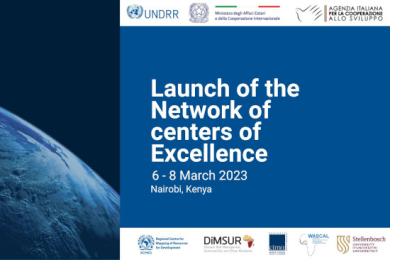The United Nations Office for Disaster Risk Reduction (UNDRR) gathered inter-governmental bodies, academia, practitioners, and scientists on 8 March 2023 to establish and launch the Africa Network of Centres of Excellence for Disaster Risk Reduction (NoE). The NoE will function as a framework for members and institutions to collaboratively develop, deliver, and share customized tools, services, products, and training for Disaster Risk Management (DRM); all guided by user needs in Africa.
With support from the Government of Italy, the launch was coordinated by: UNDRR, CIMA Research Foundation, the Partners Enhancing Resilience of People Exposed to Risks (PeriPeriU), the Regional Centre for Mapping of Resources for Development (RCMRD), the West African Science Service Centre on Climate Change and Adapted Land-use (WASCAL) and the sub-regional Technical Centre for Disaster Risk Management, Sustainability and Urban Resilience (DiMSUR).
Mr. Giovanni Grandi, Head of Office for the Italian Agency for Development Cooperation (AICS) in Nairobi shared:
“The Government of Italy has been supporting this initiative since the very beginning. I can tell you that we are willing to continue to support the further development of this initiative, and we are ready to play our part in the future as well.”
Using risk knowledge to enhance decision making
The NoE will enhance access and use of technical-scientific knowledge such as existing data, tools, and products available from different sources and platforms. While strides have been made to develop monitoring and forecasting capacities, gaps remain to transform early warnings into early and anticipatory actions by actors involved in disaster risk reduction and management (DRR/M).
Luca Rossi, Deputy Chief of UNDRR Regional Office for Africa, remarked,
“While investing in new tools and technologies, we must build on existing knowledge generated by previous programmes such as GMES, COPERNICUS, INFORM, to raise awareness on the impact disasters have onto the entire socio-economic system, and how to mitigate or prevent their impact. This is important for the ownership of the initiative by the African partners and beneficiaries, hence instrumental for its duration beyond the project timeframe.”
The first phase focuses on sustainably establishing a network that builds linkages between the international and African technical-scientific community to strengthen partnerships, enhance resident capacity on disaster risk knowledge, and capacity building that informs decision-making and policy development of public and private sector across Africa. The network will contribute to the capacity building component of the Africa Road Map and through it to the Early Warnings for All Initiative.
Integration of an all-of-society approach
During a roundtable discussion, stakeholders such as African Member States, WFP, UNOCHA, UN-Habitat, IFRC, Italy, European Commission, private sector, and other practitioners pledged support to the initiative and concluded with members emphasizing the need for the NoE to strengthen triangular cooperation among the members, the academia, and other institutions.
Luca Alinovi, the CEO of Farmshine, an agriculture platform that has a network of over 20,000 farmers in Kenya stated that:
“Usability (of data) for us means that early warning shall be able to drive the decisions of the farmers to make the right choice for the right crop to produce at the highest amount and the highest quality to be sellable on the market. I want to express my interest in our willingness to support this process.”
The EU informed that it is already supporting some of the partners of the NoE, and that a new INTPA-funded Programme “Scientific and Technological Support to Regional Centres of Excellence related to the Green Transition in Africa” was approved for 2024. One of the topics covered will be Climate and Disaster Resilience. This component of the Programme could build on and effectively complement or sustain the NoE initiative or one or several of its members.”

